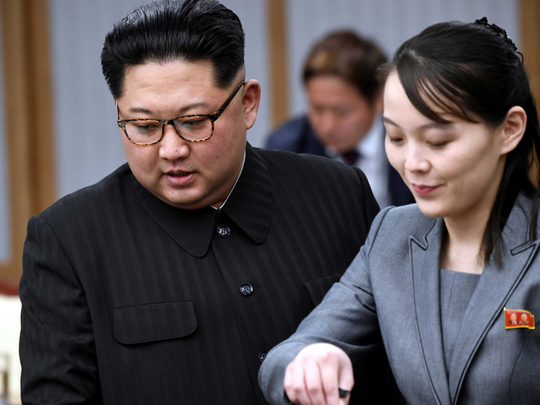
Kim Yo-jong, the only sister of North Korea’s supreme leader, Kim Jong-un, is now setting the tone of the country’s foreign policy. And if he is young and belligerent, she is younger and more belligerent still.
Early this month, after human rights activists in South Korea used balloons to send anti-North propaganda leaflets across the border, Kim Yo-jong called them “human scum” and “mongrel dogs”.
She faulted President Moon Jae-in of South Korea for failing to stop them and upbraided him for “putting his neck” into the “noose of pro-United States flunkeyism.”
She warned of “action” in reprisal, apparently threatening to destroy the Inter-Korean Liaison Office set up in 2018 to facilitate communication between the North and the South. And destroyed it was.
She also threatened to move troops into border regions that have been demilitarised.
But they weren’t. On Wednesday, Kim Jong-un halted those plans — at least for the moment.
That a woman would now be the surrogate supreme leader of North Korea is a first, but it isn’t heresy. Ensuring that the Kim family’s authority remains unchallenged supersedes any social conventions.
Some analysts have described the duet as a version of the classic good cop (Jong-un), bad cop (Yo-jong) drill. But it really is more like a bad-cop, worse-cop routine.
Why this? Why her? Why now?
Over the past two years, Kim Yo-jong’s stature at home and abroad has increased dramatically.
She was at her brother’s side during summit meetings with Moon, President Xi Jinping of China and President Trump. Less visible but no less significant: In late 2019, Kim Yo-jong reportedly was appointed as head of the Department of Organisation and Guidance, the formal locus of political power in North Korea, where all key personnel decisions related to the party, the military and the bureaucracy are made.
Yet it was only this March that she first issued a formal statement under her own name: It ridiculed Moon, calling him “mentally challenged” and a “frightened dog.” Then it was she who publicly acknowledged that Trump had sent a letter to her brother offering help in dealing with the coronavirus pandemic. She now also runs the United Front Department, which is in charge of South Korea policy.
Face of the regime
Informally, she has played the roles of spokeswoman to her brother, chief of staff and national security adviser. Shortly after the curious episode earlier this spring during which Kim Jong-un largely disappeared from view — prompting rumours that he might be incapacitated, perhaps even dead — and then reappeared, she became the face of the regime.
Accelerating efforts to bolster the leadership credentials of Kim Yo-jong is a sensible strategy from Pyongyang’s point of view.
A pandemic — unlike a famine (which North Korea has experienced) or a military attack (which it fears) — can kill princes as readily as paupers. The children of Kim Jong-un, who is said to be 36, are too young to succeed him any time soon. Again on Thursday, the Japanese government said it had “suspicions” about his health.
Kim Yo-jong, reportedly in her early 30s, has much to prove — and she might well do some of that proving, at least in the short or medium term, by ratcheting up two staple features of the Kim regime’s strategy of self-preservation: calculated external threats and extreme internal repression.
In 2012, his very first year in power, Kim Jong-un, then not yet 30, oversaw two long-range missile tests. There is no reason to think that Kim Yo-jong would be any less aggressive or tyrannical than her brother — or their father and grandfather — and she may even be more so. The nature of the regime she represents, and will perhaps one day inherit, almost demands it.
That a woman would now be the surrogate supreme leader of North Korea — a male-dominated culture, politically and otherwise — is a first, but it isn’t heresy. Ensuring that the Kim family’s authority remains unchallenged supersedes any social conventions.
The ideological foundation of the regime rests on the supposedly near-superhuman, revolutionary leadership of the country’s founding leader and his direct progeny.
Kim Jong-un’s older brother, Kim Jong-chol, has no political acumen or interests, their father, Kim Jong-il, used to say.
Kim Pyong-il, a half brother of Kim Jong-il’s, having long lived in semi-exile in Eastern Europe, is treated more like a distant relative than as a core member of the Kim clan’s rarefied “Mount Paektu bloodline.” At best, he is to be watched and contained. At worst, his life, like the lives of another uncle and a half brother of Kim Jong-un’s, could prove precarious and short.
Kim Yo-jong appears to be the sole viable torchbearer today.
For decades, North Korea’s leaders have cleverly constructed an image of weirdness. They project buffoonish bellicosity, for example, so they can peddle any dialling down later as progress, a breakthrough, a concession.
Diversion and psychological manipulation are fixtures of Pyongyang’s diplomatic playbook. Now the advent of Kim Yo-jong may offer the regime a chance to exploit, among other things, Trump’s sexism for tactical gain — and this whether she plays hardball or the part of gentle charmer.
Thursday marked the anniversary of the beginning of the Korean War in 1950, which was triggered by the North’s invasion of the South. Some expected Pyongyang to commemorate the day with some military provocation. It didn’t, but something like that almost surely is in the offing.
Expect a goad, a jab, one outrage or another, certainly challenge ahead of the election in the United States — anything to throw off Trump, beleaguered as he is by the pandemic, mass protests and a historic economic crisis. And don’t be surprised if Kim Yo-jong delivers it.
— Sung-Yoon Lee is the Kim Koo-Korea foundation professor of Korean studies and assistant professor at the Fletcher School of Law and Diplomacy, Tufts University, Massachusetts, US.





